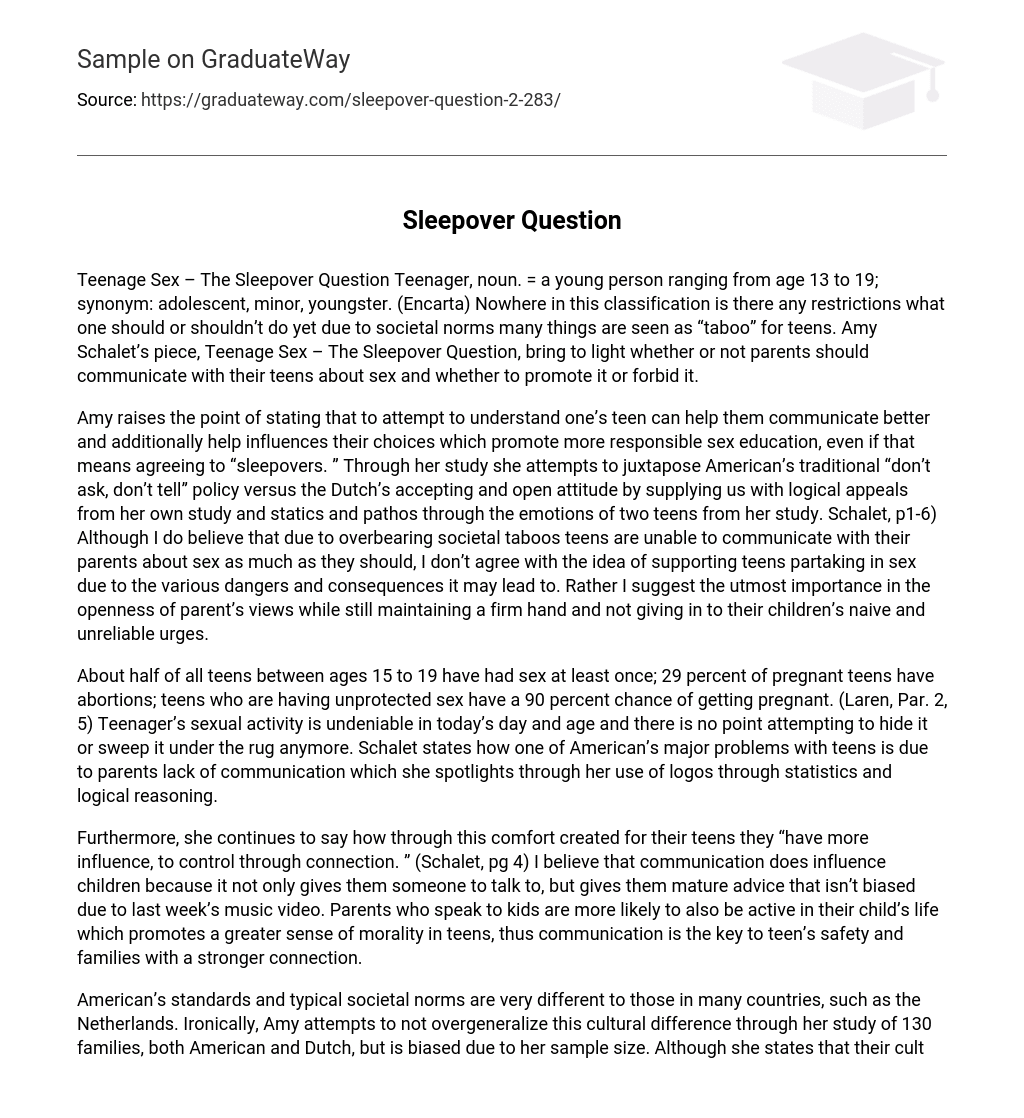The classification does not impose any restrictions on what should or shouldn’t be done. However, societal norms deem many things as “taboo” for teenagers. Amy Schalet discusses in her article “Teenage Sex – The Sleepover Question” whether parents should talk to their teenagers about sex and whether they should encourage or prohibit it.
Amy highlights the importance of parents trying to comprehend their teenagers in order to improve communication and influence their choices regarding responsible sex education, even if it involves consenting to “sleepovers.” Her study aims to compare the conventional American practice of “don’t ask, don’t tell” with the accepting and open attitude of the Dutch. She supports her claims with logical arguments based on her own research, statistical evidence, and emotional anecdotes from two teenagers who participated in her study (Schalet, p1-6).
Despite acknowledging the limitations placed on teenagers by societal taboos, I reject the notion of encouraging teenage sexual activity due to the potential risks and negative outcomes it presents. Instead, I advocate for parents to prioritize open communication while also exerting a firm and responsible parental influence, disregarding their children’s inexperienced and unpredictable desires.
Approximately half of teenagers aged 15-19 have participated in sexual activity, with a staggering 90% chance of pregnancy for those who engage in unprotected sex. Furthermore, nearly one-third of pregnant teenagers choose to undergo abortions. These statistics, referenced by Laren in paragraphs 2 and 5, provide undeniable proof of the prevalence of teenage sexual activity today. Rather than avoiding or disregarding this issue, it is crucial to openly address it. Schalet emphasizes the lack of communication between parents and teenagers as a significant problem within American society, supporting her argument through logical reasoning and statistical evidence while underscoring the importance of open dialogue.
Moreover, the author states that by creating a sense of comfort for their teenagers, parents can exert more influence and control through establishing a strong connection. (Schalet, pg 4) In my opinion, communication plays a significant role in shaping children’s behavior as it not only provides them with someone to confide in but also offers them impartial and mature guidance that is not swayed by the latest music video. Parents who engage in conversations with their children are more likely to be actively involved in their lives, leading to a heightened moral compass among teenagers. Therefore, communication serves as the key to ensuring the safety of teenagers and fostering stronger family bonds.
According to Amy’s study, the cultural differences between American and Dutch societies are significant. However, Amy acknowledges that these differences are more complicated than the stereotype of “puritanical Americans and permissive Europeans.” Her research focused on 130 families from both countries, but it is important to note that her sample size was limited to white, middle-class individuals who were not particularly religious. Schalet, pg 3
Despite not including many minorities, like Hispanic or African-American individuals, this skewed sample of the American population showcases the emotional challenges that many teenagers face as a result of their inability to communicate effectively with their parents. It also highlights the solace that can be found within this parent-child relationship. Teenagers are consistently tied to their parents’ perception of them as their “little princess,” which prevents them from growing and evolving out of fear of ruining this idealized image.
I believe that improved communication between parents and teenagers would not only increase their confidence but also provide education about safe sex, preventing them from feeling inadequate compared to their parents’ expectations. This highlights another example where effective communication can enhance the safety of adolescents, as evident from the significantly lower statistics in the Netherlands. Schalet’s approach emphasizes the importance of parents accepting their children’s sexuality and growth, which, while essential for building a stronger bond, should not be taken to an extreme.
In my opinion, her repeated efforts to mock conservative parents by implying that they should give in to their teenagers’ every desire is entirely wrong. When parents give in to their teenagers’ complaints, they are actually avoiding true parenting for the sake of ease, which does nothing but give their teenagers a false sense of freedom.
Excessive strictness may result in teenage rebellion and the necessity for justification. Through discussing and clarifying consequences, parents can offer adolescents the chance to transition into adulthood and discover a compromise. Adolescent sexuality is frequently regarded as taboo, leading to conflicts globally. Teenagers are vulnerable during this time, as they navigate their own sexual identity while still not being considered adults. It is crucial to provide them with room for growth and guidance. While I do not support parents allowing sleepovers, the old-fashioned notion of “not under my roof” should be discarded.
Parents should openly address societal fears and create a trusting environment in order to promote the development of responsible adults with morals and caution. This includes advocating for safe sex through open communication and trust.
Works Cited
-
Laren, Brandi. “Statistics on Teen Pregnancy EHow. com. ” EHow How to Videos, Articles & More – Trusted Advice for the Curious Life | EHow. com. Web. 20 Sept. 2011.
.
-
“Teenager. ” Encarta® World English Dictionary[North American Edition]. 2009.
.





